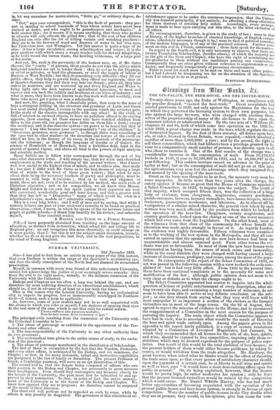D17MIA31 UNIVERSITY. 23d November 1853.
Sm—I was glad to find from an article in your paper of the 19th instant, that even Durham is within the range of the Spectator's scrutinizing eye, and that the chilly atmosphere of the North had not dimmed its accustomed penetration. Myself, in common with every true friend of this unfortunate University, cannot but acknowledge the justice of your seemingly severe remarks : they trace the evil to its right source, namely, to the intimate connexion of the University with the Cathedral. Bishops and Chapters are too often a long way behind the age, and are therefore the most unfitting directors of an educational establishment, which should be, if not in advance of, at least on a par with the times. This is the reason why the London University, having no ecclesiastical clog to impede its progress, has so immeasurably outstripped its Northern rival—if, indeed, such a term be applicable.
As, however, some of your readers may not be so well acquainted with the abuses to which you refer as myself, I am desirous of opening their eyes to the real state of the case, which is one that calls for radical reform.
" Ulcers suirusis alte possessa Non le.iore many, ferro caAtuntur et 'gni."
The principal evils resulting from the connexion of the University with the Cathedral I consider to be- 1. The abuse of patronage as exhibited in the appointment of the Pro- fessors and other officers ; 2. The non-responsibility of the University to any other authority than its own governors; 3. The ecclesiastical tone given to the entire course of study, to the exclu- sion of the practical ; 4. The abuse of patronage manifested in the distribution of Scholarships. The first of these is exemplified by the fact that the Warden, Professors, and every other officer, is nominated by the Bishop, and his nominees, the Chapter ; so that, in too many instances, talent and instructive capabilities are postponed to the ties of family or friendship. The present Professor of Greek, a Cambridge passman, will serve as an apt illustration of this. The second evil is, that the Senate being composed of officers who owe their position to the Bishop and Chapter, are necessarily in great measure their mouthpieces. Even should they contemplate any measure clearly for the benefit of the University, the plan must first be submitted to and ap- proved by their nominators. So that, in point of fact, the entire manage- ment of the University is in the hands of the Bishop and Chapter. We know how opposed they are to progress; we therefore cannot be surprised at the result of their direction.
The third evil will perhaps not be regarded as such by some, while by others it may possibly be magnified. The governors of this educational es-
tablishment appear to be under the erroneous impression, that the Univer- sity was founded principally, if not entirely, for affording a cheap education for those desirous of entering holy orders. Accordingly, every arrange. ment is made to bear upon carrying out this idea, to the utter exclusion of all others.
No encouragement, therefore, is given to the study of law ; none to that of history, of the higher branches of classical knowledge, of English compo- sition, (absolutely necessary though it be,) none to that of political economy, of the modern languages, or of any of the practical sciences. Further com- ment on this evil is, I think, unnecessary ; these facts speak for themselves.
In regard to the fourth evil, it is only necessary to observe, that there are twenty Foundation Scholarships, (besides others,) of which the majority are in the gift of the Dean and Chapter, who have the right of nominating un- der-graduates to them without the candidates passing any examination. Consequently they are often given without reference to acquirements or in-
dustry, and frequently irrespectively of pecuniary circumstances. ' There is room for much more to be said on these and many other points ; but I feel I should be trespassing too far on the attention of the Spectator were I to attempt to do so at present.
SPECTATOR DUNELILENSIS.




































 Previous page
Previous page